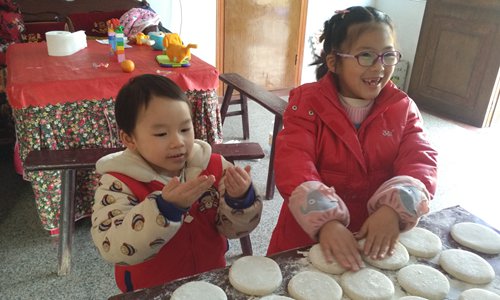
Children help their parents make traditional rice cakes before the eve of Spring Festival. Photo: Huang Jingjing/GT
As China's villages meet modernity, with such conveniences as the flushing toilet, the Internet and personal car ownership, some traditions are being left by the wayside, only remaining in memory.
This Spring Festival, I spent a week in my hill-swaddled hometown, Tianjia village in Xinning county, southern Hunan Province. It's the busiest time of year in the village. Most of its young people only return once a year from their lives in far-off cities.
Starting in the 1990s, many young villagers went to the booming manufacturing hubs of Guangdong Province, finding higher wages on offer there than anything they could make farming. Following in their footsteps, most of their children quit school as early as possible and headed to join their parents.
This has meant that most of the village's farmland is now uncultivated. The mountain where the villagers used to cut firewood and graze livestock is now returning to nature and the hilly roads we used to walk along are blocked by shrubs.
Some seniors worry that after they die no one will take care of the farmlands and the mountains.
Like countless other villages, only the elderly and children are left in Tianjia. It is a quiet and almost desolate place for most of the year, until returnees and fireworks wake it up for Spring Festival.
In the old days, each Spring Festival the village committee would invite a movie projectionist or traditional opera troupes to the primary school in the center of the village. Every household took its turn to host the performers, and they would stay in the village for as long as two weeks.
Every evening, everyone would gather in the school to enjoy the show, warming themselves with boxes of smoldering charcoal. The children, though they could hardly understand the opera, were always excited to see the performers applying their makeup and would chase each other for hours.
But these folk theatrical troupes have almost vanished from rural stages. Fewer and fewer young people are learning this art and making a living from it, and likewise the audiences who want to watch them are shrinking.
In years gone by, lion and dragon dances were a must-see custom during Spring Festival. But in recent years, they are a rare sight due to a lack of participants.
These folk crafts and skills handed down from older generations to younger are at risk of dying out, including the techniques needed to make many local culinary specialties.
As cash has flowed into the village, its houses have gotten bigger and prettier with cars now sitting outside many of them. I was surprised to learn that nearly one third of families now have their own car.
This newfound modest wealth has left people bored with old ways of having fun. During Spring Festival, while children stare at computer or smartphone screens, their parents gather to gamble on poker or mahjong. An unlucky player can lose thousands of yuan in one night, which would have been considered a fortune a generation ago.
To make sure they were ready for all this excitement, people would prepare for weeks. Families would butcher pigs, preserve meat and make rice cakes with the help of their neighbors. These communal activities were also chances for the renewal of friendships.
Now, few households raise livestock or make traditional sweets. They buy meat and candies in the local market. Machines have replaced elbow grease in the manufacture of rice cakes.
Back then, us kids loved to go door to door and spread New Year's cheer to our neighbors, stuffing our pockets with candy proffered by the hosts along the way. We took gifts and walked for hours to visit our grandparents, uncles and aunts, and stayed at their homes for several days.
But these days, the plates of candies are always full year-round. Sweets are no longer a special treat. We often drive to relatives' homes, passing them red envelopes and leaving after no more than half an hour.
We spend less time with each other and talk less, and so the bonds of family kinship have become weaker.
Some things never change though, and the villagers still love gossip. My old neighbors often asked me about my salary, many telling me I must earn at least half a million yuan a year in Beijing. But when I told them the disappointing truth, they raised their eyebrows and told me I must be hiding my true wealth.
As the festival wound down, all the young people headed back to their lives in the cities and the village grew quiet once again. The seniors updated their calendar, counting down the days until the next annual reunion with their children.
By Huang Jingjing


















































